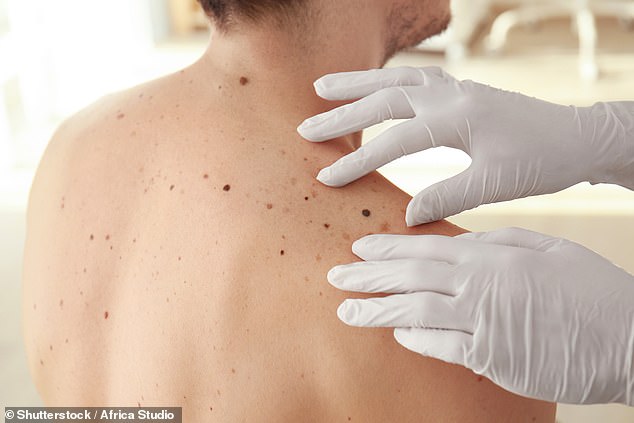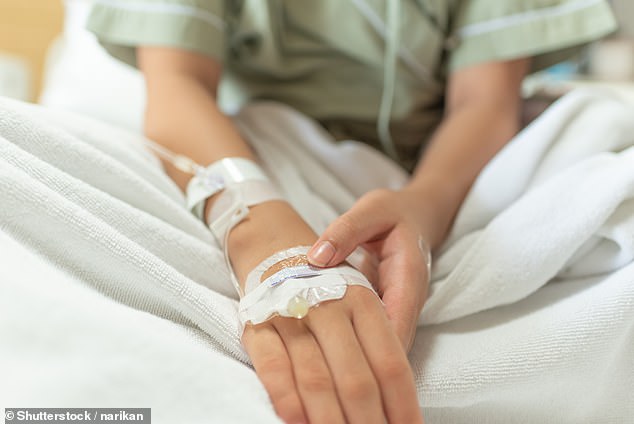NHS regulators release new combinations of skin cancer drugs to treat patients suffering debilitating side effects from current treatments
- About 2,000 Britons are diagnosed with advanced melanoma every year
- Forty percent of them cannot tolerate the current drug combination
<!–
<!–
<!– <!–
<!–
<!–
<!–
A new drug combination that could spare skin cancer patients from the debilitating side effects of current treatments has been approved by health authorities.
The mix of two drugs, sold under the brand name Opdualag, treats advanced melanoma – a crippling disease that kills more than 2,000 Britons every year. The drug consists of nivolumab and relatlimab, both of which help the body's immune system detect and destroy cancer cells.
The current combination offered by the NHS is nivolumab, combined with another drug called ipilimumab, and although it can effectively cure the disease in some patients, up to 40 percent are taken off it due to its intolerable side effects. These include fatigue, fever, anemia, swelling of the limbs and muscle pain. However, only one in five patients treated with Opdualag experience these problems.
The approval of Opdualag by the Medicines and Healthcare Products Regulatory Agency (MHRA) came after research showed the combined treatment was more effective at slowing the progression of the disease than nivolumab alone.

Around 2,000 Britons are diagnosed with melanoma skin cancer every year


The new drug combination is administered via an infusion every four weeks, as long as the patient benefits from it
Like other immunotherapy drugs, Opdualag works by blocking proteins on cancer cells that help them evade the immune system. This allows antibodies and other immune cells to detect and destroy tumors.
A study of 714 patients with previously untreated melanoma found that those who received Opdualag lived on average for ten months without their tumor getting worse, compared to four and a half months for those who received nivolumab alone.
The medicine is administered via an infusion every four weeks, as long as the treatment is useful.
Professor James Larkin, a melanoma expert at the Royal Marsden Hospital in west London, said Opdualag could be offered to older or less healthy patients who may be unable to cope with the side effects of nivolumab and ipilimumab.
“The crux is that if patients are not fit enough, we may not even think about treating them with nivolumab and ipilimumab because of the risk of side effects,” he says. “But this new treatment gives us another option.”
About 17,000 cases of melanoma are diagnosed in Britain every year. In addition to age and genetic susceptibility, excessive exposure to UV radiation – usually from the sun – is the main cause. People with fair skin who sunburn easily, and those with a large number of moles on their bodies, are also at greater risk. If melanomas are caught early, they can be removed from the upper layers of the skin. But once the cancer has spread to other parts of the body, the disease becomes harder to treat and can eventually kill you.
In 2022, reality TV star Khloe Kardashian underwent surgery to have melanoma removed from her cheek which she initially thought was a pimple. The 39-year-old has since made a full recovery. While Jamaican reggae legend Bob Marley died in 1981 at the age of 36 after being diagnosed with a rare form of melanoma that started under his toenail.
Jackie Hodgetts, nurse and melanoma specialist at Christie Hospital in Manchester, welcomed Opdualag's approval.
'When I started working with skin cancer patients 20 years ago, we had to tell those with advanced melanoma that there was no treatment. It was very gloomy. Immunotherapy drugs changed everything. Today we can confidently say that we cure some patients. If they haven't had a relapse in five years, chances are they won't.”
Ipilimumab was the first immunotherapy for skin cancer approved in 2011, followed by nivolumab and pembrolizumab. There are now also targeted therapies dabrafenib and trametinib, which give patients even more hope.
Before the approval of Opdualag, the combination of nivolumab and ipilimumab provided the best results in increasing survival. However, Jackie says: 'We usually offer the combination to younger, fitter patients as they can cope better with the side effects.
'A significant number of patients are older and have other illnesses, such as heart failure, which means they may feel even sicker if they experience side effects. That's why we should only offer them nivolumab. It is this group that we can give Opdualag to.”
